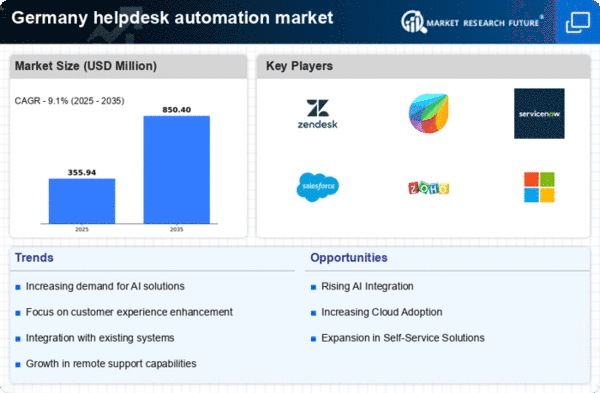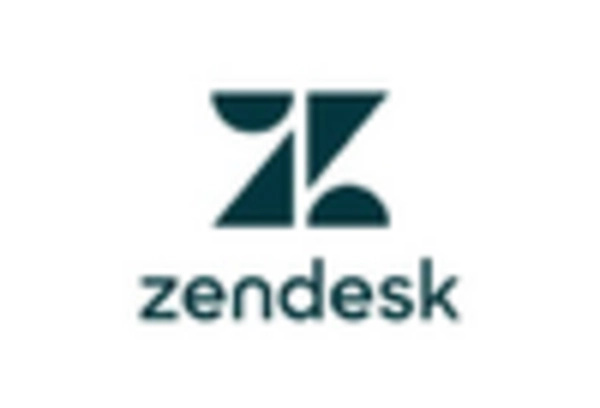Cost Reduction Initiatives
In the context of the helpdesk automation market, organizations in Germany are increasingly focused on cost reduction initiatives. The implementation of automated helpdesk solutions can lead to significant savings in operational expenses. By automating routine tasks, companies can reduce the need for extensive human resources, thereby lowering labor costs. Reports indicate that businesses can save up to 30% on operational costs by adopting automation technologies. This financial incentive is compelling for many organizations, prompting them to explore various automation tools and platforms. As a result, the helpdesk automation market is likely to witness substantial growth as companies strive to optimize their expenditures while improving service efficiency.
Increased Focus on Customer Experience
The emphasis on customer experience is becoming a pivotal driver for the helpdesk automation market in Germany. Organizations are increasingly aware that a positive customer experience can lead to higher retention rates and increased revenue. As a result, many companies are investing in automation solutions that enhance the quality of customer interactions. Data suggests that businesses that prioritize customer experience can achieve up to 60% higher profitability. This trend is prompting a shift towards automated helpdesk systems that provide personalized and efficient support. The helpdesk automation market is likely to thrive as companies seek to leverage technology to create more engaging and satisfying customer experiences.
Regulatory Compliance and Data Protection
In Germany, the helpdesk automation market is significantly impacted by the stringent regulatory compliance and data protection requirements. Organizations must adhere to laws such as the General Data Protection Regulation (GDPR), which mandates the secure handling of customer data. This regulatory landscape compels businesses to adopt automated solutions that not only streamline helpdesk operations but also ensure compliance with data protection standards. The need for secure and compliant systems is driving investments in automation technologies that can safeguard sensitive information while providing efficient customer support. Consequently, the helpdesk automation market is expected to grow as companies prioritize compliance alongside operational efficiency.
Rising Demand for Efficient Customer Support
The helpdesk automation market in Germany is experiencing a notable surge in demand for efficient customer support solutions. Businesses are increasingly recognizing the necessity of providing timely and effective assistance to their customers. This trend is driven by the growing expectation for rapid response times and seamless service experiences. According to recent data, approximately 70% of German consumers prioritize quick resolutions to their inquiries. Consequently, organizations are investing in automation technologies to streamline their helpdesk operations, thereby enhancing customer satisfaction and loyalty. The helpdesk automation market is poised to benefit from this shift, as companies seek to implement solutions that can handle a higher volume of requests while maintaining quality service.
Technological Advancements in Automation Tools
The helpdesk automation market in Germany is significantly influenced by rapid technological advancements in automation tools. Innovations such as artificial intelligence, machine learning, and natural language processing are transforming the capabilities of helpdesk solutions. These technologies enable more sophisticated interactions between customers and automated systems, enhancing the overall user experience. For instance, AI-driven chatbots can now handle complex queries, providing instant responses and reducing wait times. As these technologies continue to evolve, the helpdesk automation market is expected to expand, with businesses eager to adopt cutting-edge solutions that improve operational efficiency and customer engagement.
















